Jason Gorber's Cineruminations: Disney, STAR WARS, and a New Hope
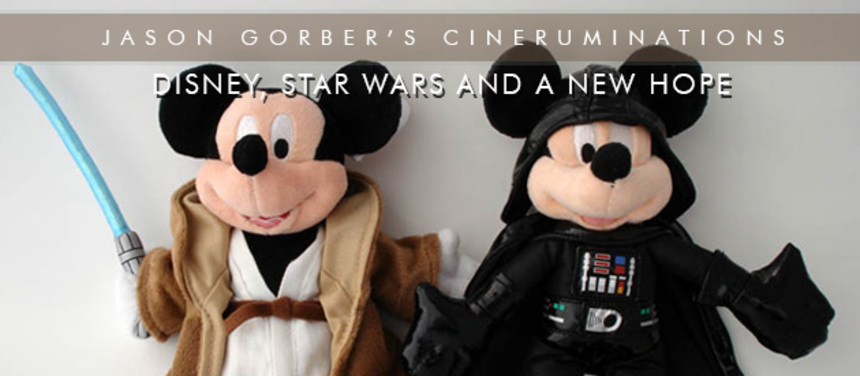
"This will be a day long remembered..."
The pithy quotes and snide, snarky tweets came fast and furious yesterday as we received the bombshell news: Lucasfilm is now part of Disney, and there will be (at least) three more Star Wars films coming to the big screen in the next few years.
I'm not sure this quite works on the level of "where were you when...", but the announcement was certainly shocking to many.
For those following such things, the move to Disney isn't so unexpected. As Lucas himself admits, Lucasfilm already worked as a "mini-Disney," with its attendant companies such as Lucasfilm Animation, effects house Industrial Light & Magic and post-production mecca Skywalker Sound.
The connection actually goes back even further; Lucas has often cited Walt as a direct precursor, and the story of George at age 11 flying with his family down for the opening of Disneyland is another one oft told. When shopping the script for what was then The Star Wars, Disney was an obvious stop. Even when production finally settled at 20th Century Fox, there were still attempts to use Disney as part of the post-production process. The birth of ILM came out of necessity and a spirit of experimentation, not a desire for some sort of break from the studio system as was subsequently claimed.
Many of the ground-breaking techniques used in the production of Star Wars came right from Disney's lot, and there have been indications that assistance with some of the cell animation on the original series (laser blasts, rotoscoping, etc.) was provided by some Disney veterans. The decision to use Vistavision for increased visual fidelity for its effects shots (a horizontally threaded 35mm process that created a larger negative) mirrors in part what Disney did in 1956 with Sleeping Beauty.
The sale also provides a reunion of sorts, as Pixar and Lucasfilm are now once again joined formally. As most will recall, the animation company was born as the computer division of ILM and eventually sold off to fend for itself. It's not quite that Pixar was once "but the learner" and are now "the master", as it's entirely unclear at this early stage just how two creative companies can exist independently within the whole. Every Pixar film to date has incorporated Lucasfilm post facilities in their workflow, and the fact that these astonishingly capable technicians and technologies are all under one virtual roof could well be a boon for advancements in production, animation, sound and visual effects processes. Or, of course, it could all collapse through consolidation and eventually result in significant layoffs due to systemic redundancies. Only time will tell, but at the least we can be certain that it will never be quite the same for either company, and at the moment the boys and girls from Pixar are the ones running the upper echelons of the studio.
The 1980s saw the first of the major collaborations between Lucas and the Disney Corporation, including the development of Star Tours. This theme park ride not only expanded the Star Wars universe slightly, it also helped fill in that time period when the popularity of the franchise was beginning to wane. Following 1983's Return of the Jedi up to the re-relaunch of the toys in 1995 and the release of the "Special Editions" in 1997, there was a dramatic decrease in the overt popularity of the saga, particularly compared to the sheer madness that transpired starting in 1977. The 90s relaunch coincided with the eventual release of the prequels and associated marketing onslaught, but it was the 2003 project by Genndy Tartakovsky (Samurai Jack, Hotel Transylvania) that first saw in visual terms a real loosening of the reins on the story line.
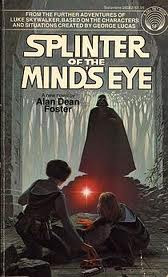
Set between Episodes II and III, this Clone Wars 2D animated show exhibited a freedom and freshness that some fans really responded to. Sure, the likes of the Droids/Ewoks animated series in the 80s was silly, kid-oriented fun, and the post-Jedi Ewok films (and much derided Holiday Special) showed certain hints of an expansion from Lucas-produced televisual content, but with Clone Wars we saw the most explicit, the most "adult" break from Lucas' hold on the core of his narrative. Books and comics had seen the universe expand (starting back with Splinter of the Mind's Eye that came right after A New Hope), but the shows and movies always seemed to fit a more rigid timeline, split between what's considered "canon" and what's just having fun in the playground.
It was clear from the outset that Clone Wars counted
as canon in a way nothing up to that point had done so. The "expanded universe" was just that, an expansion of the universe that one could easily divide between the definitive texts (the films) and all the rest. These new TV shows blurred the lines in ways that hadn't been done up to that point - Not only did they tie more explicitly to the cinematic narrative
(there's actually a bridge scene between the animated show and Episode III),
the shows vastly increased the possibilities for what counted as core elements Star Wars
aesthetic. You can see clear indication of the influence that the animated show had on the action sequences in Episodes II and III, for example.
When the animated stories moved into 3D animation (a continuing narrative working on its 5th season now), it became even more critical to the sustaining of a young fanbase. Should you see any younglings dressed as Maul or Obi-wan at Halloween tonight, chances are their first taste of the Star Wars universe came out of the TV show (or its associated merchandise, including video games) rather than the films.
Beyond just being fodder for kids, a close look at the Clone Wars series shows a freedom, grittiness and epic scale that some felt was missing from George's prequels. We have glimpses of massive battles, but by skipping over some of the more visual, visceral points of the war in favour of the grander narrative of love and betrayal, we missed out on some of the eye candy. This is what the show has done, and for careful viewers it hinted at a tantalising possibility -- what would happen if George allowed another creative team to play in the playground fully? In short, what would another Star Wars movie not so tightly controlled by the maker look like?
This is the shocking element of yesterday's announcement. The sale to Disney, well, that makes total and complete sense. But the fact that 2015 will see the launch of Star Wars: Episode VII?
Mind-boggling.
Even a casual fan will point to all the vintage interviews and hints about three associated prequels, each set about a generation apart. Many of us would just as forcefully remonstrate that for years these hints were nothing more that similarly thrown away comments that Lucas would habitually make, that we'd never see more live action films explicitly under the Star Wars name. The "Holy Trilogy" would stand always, and the slightly sullied "New Testament" prequels provided the extent of what we would receive.
The story following the destruction of the second Death Star was seen as an open field, free to be mined by the likes of Timothy Zahn's books. We saw Han and Leia hook up and have Jedi kids, some new baddies showed up, and the narrative ran free within the confines of novels. Frankly, while the books are pretty decent, in terms of canon many felt that these were free to run with the story as a kind of tame slash fiction, a "what if?" scenario that didn't fundamentally change the course of the accepted history. There were three films, then there were six, then they were done. The circle, as it were, was very much complete.
Now, we've seen the opening up of a whole new can of space slugs.
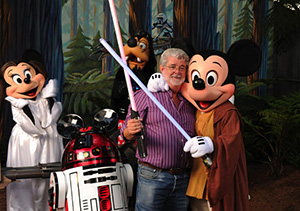
What do we know so far about these new films? Well, we know that Kathleen Kennedy, recently placed in charge of the Lucasfilm empire, will be in charge of production. Not mentioned yet is stalwart Rick McCallum, although it remains possible he'll help bring the new films to life. There was never a more patient or vociferous showman for the prequels than Rick, and it'd be nice to see him help bring the new trilogy to life as well.
We were granted a couple official videos following the announcement, one of which included this somewhat astonishing statement from George: "We can go on making Star Wars for the next 100 years." We know that George has "treatments" for Eps VII/VIII/IX, and have had hints that they derived from the story sessions he had while helping to shape the Clone Wars show.
What was clear about this television show is that it not only freed up the narrative, it freed up George as well. You can see in some of the supplemental material included on the Blu-rays the fun that GL had in the pitching of various story ideas. It was George who toyed with his own timelines more often than his team of writers, and there have been many interviews in which these writers have talked about how darkly comic George is with his own creation.
Thus, the new films will have the imprimatur of The Master, with the freedom of a new generation of writers and artists working within this universe. Done right, this could be an incredibly exciting cinematic event, one that the television show proves can be engaging. Done poorly, and we'll see even further denigration of the meaning of the "Holy Trilogy," as the line between product and narrative is blurred even more.
We can guess that these three new films will be set a generation (20 to 30 years) apart from the last set, but at the moment we don't even know that they'll be live action! J.W. Rintzler, author of some stunning books on the making of the original series, has a nice primer on the shifting nature of these further episodes. Lucas mused in 1980 about a third trilogy: "What happens to Luke after [Episode VI] ... is much more ethereal. I have a tiny notebook full of notes on that. If I'm really ambitious, I could proceed to figure out what would have happened to Luke."
Is this what we're going to get? Hard to say, the future is.
The films could be set immediately following Jedi, or they could be 1000 years in the future. Many books, comics and games have fleshed out the first rise of Sith, and this Tolkeinesque mythology could be greatly expanded upon, following multiple timelines simultaneously. One would assume the films would stick with their action/adventure serial theme, but they easily could become bloated with flashbacks like Cloud Atlas, or an epic and deliriously excellent multi-temporal sequel like Godfather II.
We can all pray to the Midicholorians for the latter.
Following the announcement, we got more than a few amusing comments from the potential cast members on Twitter. Ewan McGreggor asked: "Wonder if they will need any Obi-Wan Hologram action??! #ep7 #donthecloakagain #thesearenotthedroidsyourlookingfor #movealongmovalong", while this came from Mark Hamill: "Congratulations to George for today's mega-deal! Can't comment on Ep 7 before I have all the facts which are short supply right now-Patience"
Patience is hard to come by these days, especially for a project of this nature. The call explicitly said that we're getting a 2015 release of the first of the new trilogy. That lands the film smack in line with another Disney mega-tentpole, Avengers II, as well as the likes of Justice League. Does the existence of a new Star Wars film mean that it automatically gets its late-May slot opened up for it? Will it be quite the same to have one of the live action films begin without the drum role of Alfred Newman's "Fox Fanfare," the horns of the John Williams-conducted LSO blaring out the canon call to start the film, that delicious pause when the Frutiger cyan text lets the audience know that this story takes place "A Long Time Ago, in a Galaxy Far, Far Away..."
I'm palpitating just thinking about it.
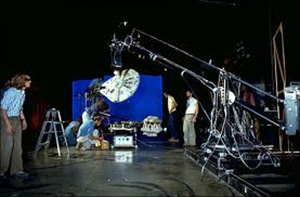
We maybe could have seen the hints that led up to this. Pablo Hidalgo, one of the core members of the Star Wars fan community, rejoined the fold. He admitted in a post yesterday that he was told about "the Return" back in June of this year, just weeks after Kennedy was installed as head of the studio. Clearly all these elements are related, and this is part of a larger plan of Lucas to see his creation proceed long past his involvement. His ILM has been instrumental in helping bring Gene Roddenberry's own creation to new Generations, and has seen how various stewards of the Star Trek franchise have made either bold or ridiculous contributions to the mythos.
Who could possibly step in to shape this new trilogy of films? Will there be a single director for all, bringing a strong vision, or will we get another Richard Marquand, a yeoman who will simply get the material on screen without any particular stylistic flourish? My bet is that Lucas wants to see someone muck around with the films, and that we'll see someone like a Duncan Jones (Moon), or Rian Johnson (Looper), or even Red Tails' Anthony Hemingway, a young-ish director still hungry to make their mark and provide their own flourish on the works.
It's safe to say that Kennedy and Lucas' shared connection to Spielberg won't result in that filmmaker stepping in again, but it would be amusing to think of the likes of the (uber-busy) Guillermo Del Toro taking a crack at it. Perhaps we'll get some Michael Bay/McG style insanity, or that they'll think way outside the box and choose someone completely unique.
My own dream? I've long said I'd love the Coen Brothers to do a sci-fi/space fantasy; their own sardonic take on the genre would probably be magnificent. I figure if Kubrick could whip out 2001, why can't the guys that brought us the UFO in The Man Who Wasn't There ratchet things up a bit?
Whatever happens, we're in reasonably uncharted territory here. We can assume that the 3D versions of the six films are still very much in play. There was immediate talk of the sale opening up the possibility for a Blu-ray release of the "un-futzed" with, '77/'80/'83 "Greedo Shoots First" versions, but there's no doubt loads of issues with that, notwithstanding continued relationships with Fox home video. The Disney sale also includes characters like Indiana Jones, but the call to investors yesterday made it very clear that the focus was on the Star Wars properties. Talk of American Graffiti-themed diners at Disney parks, or Howard the Duck mixing it up with Donald while Willow looks on, is premature.
Buried in the official video was, for me, one of the more telling, interesting moments. Lucas talks of the wisdom of the deal, stating: "I'm investing in Disney, because that's my retirement fund!" He also let it be known that he's still planning on doing the "experimental films" that he's been hinting at for over four decades now.
I'm amused at the very thought that this still is something that drives him.
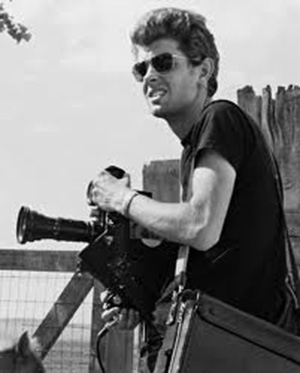
You can go back to interviews with the director around the time of the (highly experimental) THX:1138 and see the exact same tension between Hollywood filmmaking and the avant-garde films that fueled Lucas' imagination. It's hard, decades later, to think of Star Wars as anything less than a sure thing, yet to imagine pitching such a ludicrous story to unwitting studio executives, promising a film made on budget using technology that had still to be invented, showed as much chutzpah as any production in cinema history. Rintzler's books do a magnificent job detailing this period, including the bitter negotiations surrounding Empire, and the very real indication that the sequel was doomed to flop (just as the Graffiti sequel had done).
Even then, Lucas was wary of making big budget films, ambivalent about his success. He liked the playground, but didn't like what surrounded it, and built a cloistered empire just so he could do things his way.
He has now fully freed himself from the responsibilities of being Emperor, yet has all the benefits he has always claimed to want. He has ludicrous financial security, a team that can run both the day-to-day operations of his various companies and take over the most beloved of his creations. Lucas can chime in and present ideas, yet can distance himself from the scorn and vitriol that many of his "fans" pile on with regularity.
Whether or not Lucas makes some weird and experimental film that no one gets to see, I don't really care, I just kind of adore that it's still a dream of his. He's probably been telling that story so long he almost believes it himself, so we can hope for something intensely interesting to come from him.
The future for Lucasfilm as a standalone entity long term is also uncertain, despite the clear indications from both parties that there will be a continuity of service for the time being. Disney has been pretty great at keeping Pixar and Marvel as relatively self-sustaining elements, but the inclusion of a third animated studio and duplicate effects and post-production house must certainly result in some consolidation.
There was news last year that Kerner Optical, the vestige of the ILM model shop that drew its history right back to the original production on Star Wars, had gone bankrupt. Only last month, Digital Domain, the effects company that James Cameron helped found, also saw its business fortunes collapse. With the Disney acquisition of ILM, Peter Jackson's Weta (modeled, of course, on Lucas' company) remains one of the few mini-major independent effects houses, fueled at least for now by a few years of Hobbit-y goodness. In many ways, the acquisition ends an era of independent filmmaking on the scale of a mini-mogul, and demonstrates explicitly the new normal of big budget film production.
One can hope that the future of the combined company is bright, that the minds that came up with Rango (superior to any Pixar/Disney film of last year) will continue to flourish. At its best, we'll see an even more impressive Disney company for years to come, with extraordinary productions coming out of the shared family of companies. We may see a revitalized Star Wars series, with the injection of new blood and new ideas, building upon the incredible success that the other films have shown.
We also might be in for a truly repellent cinema experience, some film-by-committee monstrosity with dozens of writers and the sales executives in charge of crafting the narrative. As much as Lucas was derided for doing the same, things could get a whole heck of a lot worse.
I'll choose to be optimistic here. I'll have a new hope, a hope that we'll see something new and exciting. I'll be pleased to see the expansion of the worlds of Star Wars to theme parks and rides, provided the core content remains well curated. I'll continue to be amazed by some of the imagery I'll see on screen, and can hope that the synergy of the new Disney companies results in movie magic for many more decades. This may not be the end of an era, but the end of the beginning of a digital cinema renaissance that Lucas helped birth more than any other.
As for the next three films, J.J. Abrams' Star Trek reboot shows the way things can be done, and done well, and we can assume that lessons can be drawn from that film. Or they could well be terrible. Regardless, I hope they're given a chance, and I hope the filmmakers take chances, take the worlds and characters in unexpected and intriguing directions. This is an amazing, if shocking opportunity, and I hope they don't mess it up.
At the least, I know I'll be there. I already consider myself to be in line for 2015.
I hope to see you there.







